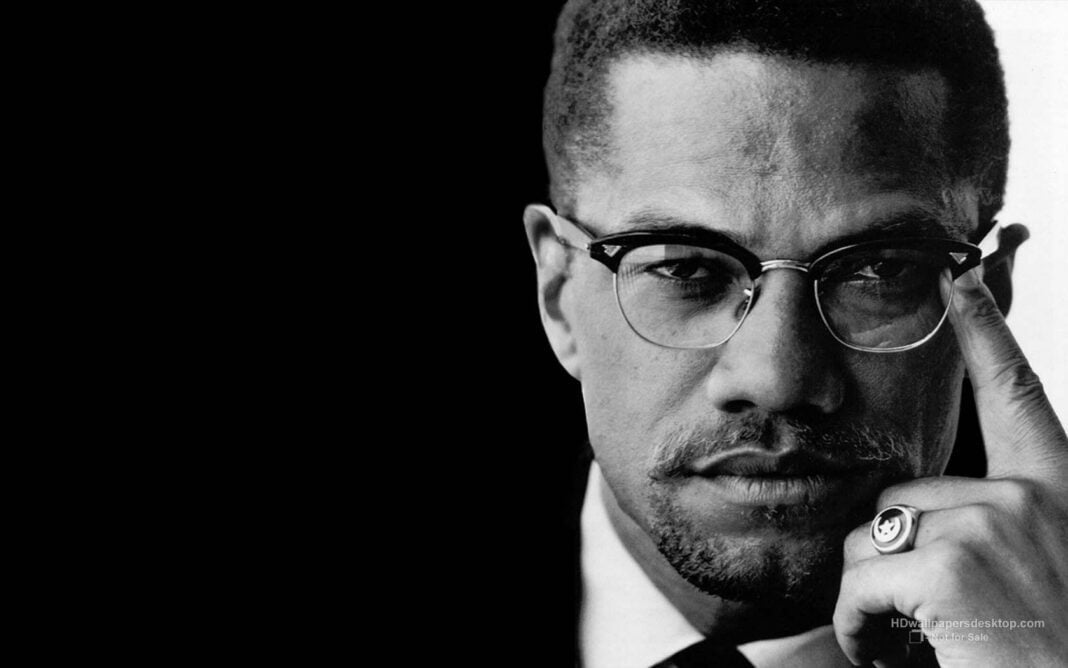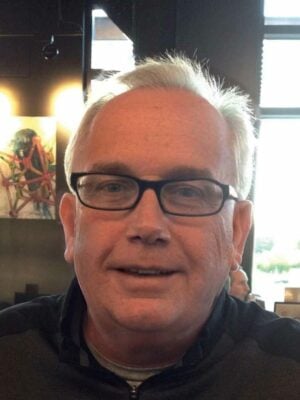The Indianapolis City-County Council has proclaimed May 19, 2025, as Malcolm X Day in Indianapolis. The centennial commemoration will unfold across Malcolm X Weekend — a community-centered series of events rooted in education, reverence and joy.
On Saturday, May 17, the community will gather at the Riverside Center for a celebration inclusive of youth activities and cultural expression. On Sunday, May 18, an all-female panel, “Women Who Impacted Malcolm X,” will honor the lives and legacies of his mother, Louise Little, his sister, Ella Little-Collins, and his wife, Dr. Betty Shabazz — three Black women who helped shape one of the most important figures of the 20th century.
Imam Michael Saahir, a longtime spiritual leader and activist in Indianapolis helped bring this weekend to life. I sat down with Saahir to reflect on X’s enduring impact, the power of naming, and what it means to honor not just a man but a movement.
What inspired you to organize a Malcolm X Centennial Weekend, and what does this moment mean to you?
Saahir: Society tends to selectively highlight figures, and I’ve noticed we often fail to fully recognize Malcolm — both nationally and internationally — for the powerful impact he had.
In some places around the world — Europe, Iran, across Africa — there are colleges, high schools, and even streets named after Malcolm X. His contributions were global. His voice still resonates.
Personally, Malcolm X had a profound effect on me. I first encountered his words as a teenager in the early ’70s, when I was still in high school. I got my first Malcolm X album from Lyric Records, a store downtown.
It was a five-album set — on vinyl. I remember being captivated by the sound of his voice and the depth of what he was teaching. Malcolm X taught me to think. And I believe he’s still teaching generations today if we listen.
With the official proclamation now on record, what this recognition truly means for the city — and for you personally?
Saahir: It blew my mind — really. Hearing the City-County Council not only name the day after him but speaking openly about his legacy was powerful.
The proclamation spoke of his resilience, his transformation, and his ability to inspire others to embrace their identity and challenge systemic oppression — “by any means necessary.”
How do you hope this proclamation shapes the legacy of Malcolm X in our community — especially among young people?
Saahir: We must recognize that it’s okay to honor our history — even before it’s made “official.” Malcolm’s legacy, like King’s, is often softened in public discourse. But they were both bold, complex, radical men. King believed in love, yes — but it was the kind of love that rolled up its sleeves. A love that fought for justice.
That’s what I hope young people take away from this proclamation — that Malcolm X wasn’t just a man to admire but a man to study, learn from, and emulate. Because his love for us was fierce, demanding that we love ourselves enough to fight for a better world.
How would you describe Malcolm X’s evolution, and what lessons does that transformation offer us today?
Saahir: Malcolm’s transformation from street hustler to minister to international statesman shows what it means to reclaim yourself.
He didn’t just change names; he changed his purpose. In prison, they called him “the Devil” because he was so rebellious, but that same fire became the fuel for his faith. He met the teachings of the Honorable Elijah Muhammad and became Minister Malcolm. Then he journeyed beyond even that — to El-Hajj Malik El-Shabazz — a man who believed in the global unity of humanity, not just the redemption of Black folks in America.
Malcolm’s journey reminds us that we are not static — we are evolving, unfolding and capable of radical change. That’s the lesson I hope people carry: don’t let anyone freeze you in a moment. Keep growing.
What role does Islam play in how you honor Malcolm’s legacy?
Saahir: A big one — because we can’t just honor parts of Malcolm.
We dishonor him when we leave out his faith. Malcolm was a man of deep, evolving belief. His spirituality wasn’t just a footnote — it was central to his transformation.
So, when we planned this Centennial Weekend, we were intentional about honoring the whole man. To do less would be a disservice — not just to Malcolm, but to our children. His faith roots go way back. … He didn’t sell out for fame, money or position — and that, too, is faith. That kind of integrity — the refusal to compromise — that’s something people of all faiths can learn from.
Why was it important to center the second day around the women in Malcolm’s life?
Saahir: We needed to shift the spotlight. Too often, the women behind powerful men are overlooked — even when they are pivotal to the story.
Day Two of the Malcolm X Centennial Weekend was about correcting that. Malcolm’s mother, Louise Little, was a Garveyite who raised her children with a deep sense of purpose and pride. His sister Ella was the one who brought him to Boston, helped turn his life around, and later paid for his pilgrimage to Mecca. His wife, Dr. Betty Shabazz, held the family and legacy together after he was assassinated.
People say, “Behind every great man is a great woman,” but that’s not strong enough. These women stood with Malcolm. They were warriors in their own right.
What do you hope attendees will take away from this all-female panel?
Saahir: I want attendees to walk away with a renewed respect for the voice, vision and intellect of our sisters. This panel is not only about honoring the women who stood in Malcolm’s life and legacy but also uplifting the women leading right now.
We are correcting the historical oversight, yes — but more importantly, we are creating space to celebrate and listen to the wisdom women bring into our present. We want people to leave, understanding that justice and liberation are not gendered — they’re guided, nurtured and carried forward by all who are committed to the cause.
How has Malcolm X influenced your path and approach to leadership?
Saahir: Malcolm gave me the courage to speak the truth, even when it’s uncomfortable. He was unshakably honest, and that honesty evolved as he evolved. He taught us that you can be sincere in your knowledge and still grow.
There’s a verse in the Qur’an that says, “Tell the truth — even if it’s against yourself or your parents.” Malcolm lived that. He didn’t just speak for applause; he spoke from principle.
What do you envision for the future of Malcolm X Weekend?
Saahir: Absolutely. Our prayer is that Malcolm X Weekend becomes an annual tradition—one that continues to grow, evolve and bring communities together.
Ultimately, we want to come together around Malcolm’s birthday and throughout the year — across faiths, backgrounds and ideologies — on common terms. Because when a racist cop pulls you over, he’s not asking your religion. He’s responding to your Blackness. So, our unity must be deeper than doctrine; it must be rooted in shared humanity, shared struggle and shared purpose.
What can Indianapolis and Black communities more broadly do to keep Malcolm’s legacy alive?
Saahir: It starts with daily practice. Beyond commemorations, we’ve got to live Malcolm’s values — justice, self-determination, discipline, truth-telling — in our everyday lives. And we’ve got to teach.
When I see a young person wearing a shirt with Malcolm on it, I stop them and ask, “What do you know about Malcolm?” A lot of them just mention the Spike Lee movie. I say, “No, not just the movie. What do you really know?” And even the roughest-looking ones stop and listen. They’re curious. They want to know.
Whether it’s Juneteenth or DIY liberation movements, we don’t need to be told our history matters. We must teach our children that. Because when we know better, we do better. Declare your independence. You don’t need validation. That was Malcolm’s message.
What call to action would you leave with those honoring Malcolm’s legacy this weekend?
Saahir: Education. That’s the call. People think they know, but most don’t. They know a little bit, just enough to feel smart, but not enough to act right. We need proper, rigorous education — Malcolm-level education. If your teacher can’t teach you, find a new one. One of the pillars of this weekend should be education, education and education.
Join the community May 17-18, 2025, for Malcolm X weekend. For the full interview click here and enjoy.
LaTASHA BOYD JONES
Tasha Jones is a poet, writer, researcher, and educator whose work explores language as a tool for liberation and resistance. She hosts In the Beginning: The Spoken Word Podcast, the #1 spoken word podcast on Apple and Spotify. Tasha is also the Poems & Parables Literary Journal editor and is currently writing Pyramids. Plantations. Projects. Penitentiaries. You can follow her on social media: @iamtashajones, @itbspokenwordpod, and @poemsandparables.





